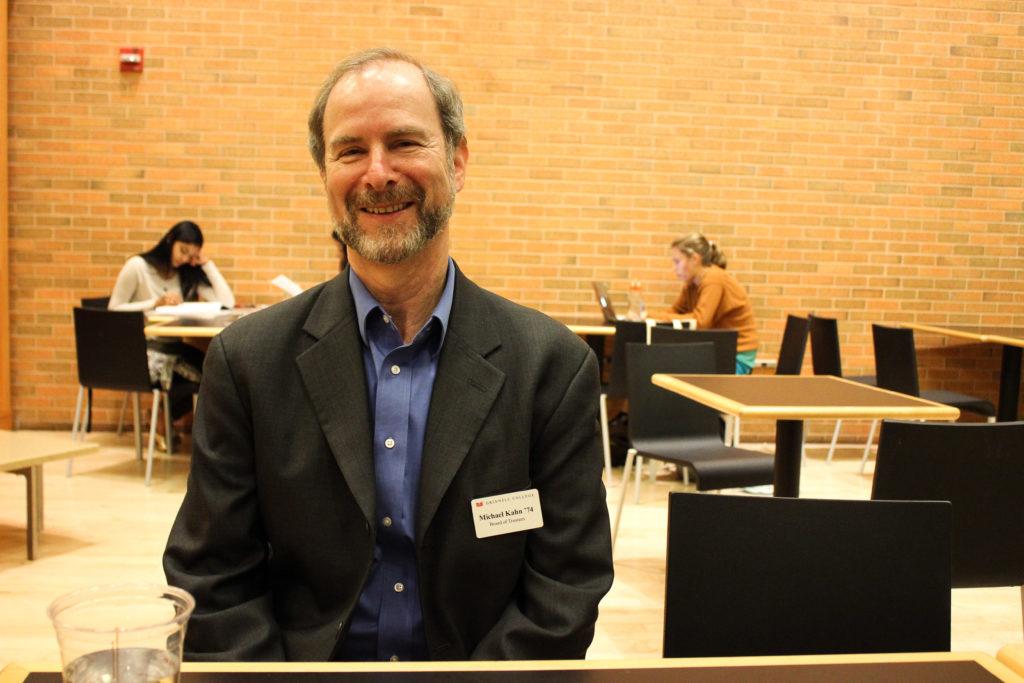By Jackson Schulte
schultej@grinnell.edu
As the College’s Fossil Fuel and Climate Impact Task Force and the Board of Trustees wrap up their meetings this week, participants acknowledged the College’s need to address its carbon footprint, the way the endowment supports the fossil fuel industry and the College’s rights to profitable oil extraction in Texas, Oklahoma and Kansas.
Michael Kahn ’74, a trustee and head of the task force, discussed the College’s mineral rights during the third session of open discussions held by the task force. Kahn explained that when Fred Darby, an oil tycoon who graduated in the class of 1895, died, he donated 5 million dollars to the College.

“Darby’s estate bequest included mineral rights. Grinnell’s investment team highlighted these mineral rights as part of our endowment fossil fuel holdings during their September 19th presentation,” Kahn wrote in an email to The S&B. “Currently, the College operates these mineral rights through a holding company called Poweshiek Petroleum Corporation (PPC).”
In his email, Kahn noted that, while called a “Petroleum Corporation,” the PPC is technically not an oil company, and thus goes untaxed.
“[Poweshiek Petroleum Corporation] is not actually an oil company at all, though it is associated with oil rights. … It is very important that Grinnell College maintain its tax exempt status and some of the holdings in the Darby bequest are taxable assets. So Poweshiek Petroleum was set up to house these taxable mineral rights assets in order to keep these taxable assets separate from our non-taxable assets.”
Andrew Choquette ’00, director of investments, also noted in an email to The S&B that “[t]he mineral rights held in Poweshiek Petroleum are certainly tied to oil and gas extraction. The distinction though is that Poweshiek Petroleum is a holding company for those rights versus an operating company where the College is making operational decisions.”
Nonetheless, the College profits from the mineral rights by leasing them to energy companies. According to Mineral Holders, a database of mineral rights leases in Texas, the College leases its mineral rights to several energy companies, including Chevron, ConocoPhillips and many more.
“Other entities are doing the extraction and the College does not make any operational decisions related to the rights. The College does, though, have the ability to make the decision to sell these rights,” Choquette wrote.
Choquette revealed that the College made $710,285 from assets held in Poweshiek Petroleum from fiscal years 2005 through 2017. In fiscal year 2015, it was estimated that the carbon footprint from the College’s mineral rights was roughly 1,700 metric tons of carbon dioxide per year.
The major hurdle the College would have to address in getting rid of its mineral rights is a financial loss.
“One issue highlighted by the investment team is that nobody gets fair market value for mineral rights, so any decision to divest these assets would mean certain loss of income to the College,” Kahn wrote.
In the Fossil Fuels and Climate Impact Task Force’s dialogue sessions in September, a member of the audience asked whether the College could keep the mineral rights but leave the fossil fuels in the ground, preventing any potential buyers from extracting the fossil fuels from the Earth.
“The thing that we have to always try to balance is the revenue to the school and the ability to provide an education and support the operating budget,” Choquette responded at the session.
Another audience member asked whether Poweshiek Petroleum could switch its direction and create renewable energy on the land that stores the mineral rights, given topographical viability.
“That’s an idea. … The mineral rights are scattered all over the country. If it were just one oil field it might be a little easier to handle, but, you know, Texas, Oklahoma, Kansas — that’s a lot of different properties,” responded Angela Clement, associate director of investments.
“There are many shared social values that we all have. If we had to purify our endowment from all those things that we might take offense at, it could well mean fundamentally changing what Grinnell College is, who can come here, financially, and many, many other things. This task force exists because we think [the College’s investment in fossil fuels] does merit serious examination,” Kahn said during a September session.
In the immediate future, the Fossil Fuel and Climate Impact Task Force will face tough choices regarding the mineral rights. Professor Wayne Moyer, political science and member of the task force, said that the trustees must be transparent when discussing the mineral rights.
“There was no effort to conceal anything to anybody. The trustees conveyed that [the mineral rights are] an issue they want to deal with,” said Professor Wayne Moyer, political science and member of the task force. “This is an issue they have to address. … And they have to be public about it. My sense is they haven’t made any final decisions.”
Kahn concluded his email with a reminder to Grinnellians that “[t]he three task force trustees are after all Grinnellians who care deeply about environmental issues and want to see the College we love make a difference in addressing the impacts of climate change.”
Going forward, it will be important for the Grinnell College community to stay on top of the task force’s agenda and reach out with questions and concerns. Suggestions and feedback for the task force can be sent to fossilfuels@grinnell.edu.




































































